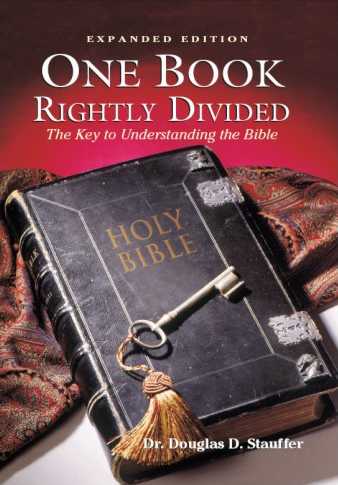Introduction
Consider the average man (or woman) who
enters a Christian bookstore to buy a Bible. He reminds me of the man who
fell off the top of a ten-story building. At every floor on the way down you
could hear him saying, “So far, so good…so far, so good…so far, so good.” He
simply ignored the sudden reverse of fortune awaiting him at the bottom of
the first floor.
Watch the
Bible-buyer as he finds the Bible section of the bookstore and flips through
six or eight hot versions. I cannot tell you what versions this may
include since every few months bookstores tout a new bible as the latest
word from God. It promises to be more up-to-date, more understandable and
more relevant than the 200 or so translations that preceded it over the
course of the last century.
Anyway, back to
our shopper. He finds a bible he likes. It has a nice look and feel. The
notes seem helpful. He reads a verse or two. It sounds like modern English.
The store clerk tells him that he is holding a good choice in his hands. It
has been translated by the best scholars and is recommended by famous
people. He lays down his $40 (or $60 or $80) and proudly carries his new
possession home with him.
He has now made
a financial commitment to his version and has no intention of allowing any
challenges to its veracity. He rejects any hint that it might have made
critical subtractions from God’s word. He may sense that it does not sound
the same as the Bible of his grandmother. He may be forced to admit that
some verses are missing. But he chooses to keep his eyes closed. He does not
notice that the present bibles have changed much more than the earlier
revisions did. He does not care that future versions will make even more
drastic changes. He is happily oblivious to the coming crash awaiting him at
the bottom of the first floor. He might as well be saying, “So far, so
good…so far, so good…so far, so good…”
This book is
written for those of you who really want to know what is happening to the
English Bible. If you prefer to be ignorant about the changes being made and
the doctrines being diminished, perverted, or erased, then you do not need
to read this book. It might upset you. It might make you notice things you
have been able to ignore prior to this time. No, for your own peace of mind,
just put it back on the shelf where you got it.
However, if you
really want to know the truth and are not afraid of where it might lead you…
if being right is more important to you than being accepted… then just keep
reading. At times you will laugh and at other times you will cry. Some pages
will cause your blood to boil and others will make you want to know more. As
a preview, look at the New International Version and consider some of the
changes being made in this popular translation.
Verses Omitted
The NIV has
totally omitted seventeen verses. In it, you no longer read Matthew
17:21; 18:11; 23:14; Mark 7:16; 9:44,46; 11:26; 15:28; Luke 17:36; 23:17;
John 5:4; Acts 8:37; 15:34; 24:7; 28:29; Romans 16:24; or I
John 5:7. These verses deal with doctrines of great importance: the
doctrine of the Trinity (I John 5:7); the doctrine of hell
(Mark 9:44,46); the doctrine of salvation (Matthew 18:11; Mark 15:28; Acts 8:37); the doctrine of prayer
(Matthew 17:21). Other passages remain in the NIV, but the
marginal notes discredit them. These notes reveal that the NIV translators
would have preferred to leave out Mark 16:9-20 and John
7:53-8:11. That’s an additional 24 verses. Why would someone want to
remove these passages? Who would want to remove Matthew 18:11
which states, “For the Son of man is come to save that which was lost”?
In spite of these and even more disturbing alterations, the advocates of the
new versions declare that no doctrines are changed in the new bibles.
Words Omitted
Something else
is disappearing from the NIV. There are many biblically significant words
that are simply no longer there. By this, I mean that these words are not
mentioned even one time in the NIV. Words conspicuously absent from the NIV
include all of the following words enclosed in quotation marks. There is no
longer a “Godhead.” There is no “Jehovah” or “blessed and only potentate.”
There is no “Holy Ghost” and He is not the “Comforter.” God is no longer
“immutable” or “omnipotent” – there goes Handel’s Messiah!
Christ is no
longer the “only begotten” or the “first begotten.” We no longer need to
worry about “devils” or “Lucifer” or “damnation” or “brimstone” or the
“bottomless pit.” Hell, which is mentioned 54 times in the KJB, is mentioned
only fourteen times in the NIV and is entirely removed from the Old
Testament. But why worry about hell or damnation? In the NIV, there are no
“trucebreakers” or “winebibbers.” No one is ever accused of being “carnal,”
“slothful,” or “unthankful.” In the NIV, there is no “backbiting,” “vanity,”
“lasciviousness,” “fornication,” or “whoredom.” In fact, no one is
“effeminate” and there are no “sodomites.” No wonder liberals so readily
accept this bible.
It is a good
thing that there is not much to be saved from in the NIV, since it is
harder to get saved as well. No longer is Christ crucified on “Calvary.” He
is not the “testator” who brings us the New Testament or the “daysman” who
stands between God and us. He has not sprinkled His blood on the “mercyseat.”
He was not placed in the “sepulchre” and His resurrection is no longer
established by many “infallible” proofs. It only makes sense then that we
are no longer “quickened” and there is no more “propitiation” or “remission”
or “regeneration” in the NIV. Did you get that? No “Calvary;” no
“propitiation;” no “regeneration.”
All of the words
in quotation marks—as well as many others that could be cited—have been
totally removed from between the covers of the New International Version.
Therefore, it follows that the word of God is no longer “incorruptible.” It
is not the “engrafted” word of God. There is no “verity” and Christ does not
say “verily, verily.” There is no “science” falsely so-called and there are
no “fables.” Perhaps that is why the saints no longer “abide in Christ.”
“Archaic” Language
Another victim
of the modern versions has been the very language of the Bible that makes it
sound like the Bible. English scholars recognize a category of English which
they call biblical English.1 It
is the English of the King James Bible and of other English versions of that
era. These same scholars point out that the modern versions of the Bible are
not written in biblical English. And, despite the claim of recent
translators that this is simply the language of the time, it is not. The
language of the King James Bible is distinct from any spoken English of any
time period of English history.
The biblical
English of the King James Bible stems from two sources: the historical,
“archaic” English vocabulary and grammar and the transparency of the English
text that maintains the style of the Hebrew and Greek languages. Scholars
most often attack the “archaic” language of the King James Bible. People may
have spoken that way in 1611, they say, but we speak differently now. We
need a Bible that sounds the way we talk.
Yet, the English
of the King James Bible was not the way common English speech sounded in
1611. For instance, the thee’s and thou’s of the King James
Bible were seldom used by common speakers of that time. Even when
encountered in conversation, these pronouns were spoken differently from
their written use in the Bible. In the Bible, thee and thou
are always singular (referring to one person or group) second person
pronouns, while ye and you are always plural second person
pronouns. This grammatical device, by the way, retains the distinction
between the singular and plural you as found both in Hebrew and in
Greek. The modern versions lose this distinction.
We do not
incorporate this distinction of singularity and plurality into modern
English. We always say you (except when we say you all, etc.).
But so did most of the English-speaking people of 1611. Just consider the
Dedication written to King James by the translators of the KJB. (It is found
in the front of many Bibles.) Throughout this document, King James is
referred to as you and your even though he is obviously one
person. The King James Bible and the Dedication to King James were written
at the same time and by the same men. However, the documents use you
in two totally different ways. This difference alone illustrates well that
the language of the King James Bible was not the common language of 1611. It
was meant to be different; it was biblical English.
Even the older
verb endings (such as –est and –eth) were not commonly used in
English conversation in 1611. Individuals of this era used believe or
believes in talking to one another—not believest and believeth. Why then were these older forms retained in the King James
Bible? Seth Lerer, in his taped course on The History of the English
Language, states that he believes that the translators attempted “to
produce a highly crafted, artificial, elevated and, at times, archaic
language—a language that will stand, not just the test of time, but will
contain within it the time frame of the history of English.”2 In
other words, the language of the King James Bible was designed from the
beginning to be distinct from all other language. It was designed, I
believe, by God to stand apart from the language of any particular period.
It was written in a timeless language.
Biblical English
Greek teachers
of an earlier age understood that the Greek of the New Testament was not
exactly like any Greek that was ever spoken. They called it Biblical Greek.3 Because
of the recent emphasis on having a contemporary language Bible, we now hear
of Koine or Common Greek instead of Biblical Greek. And, concerning the Old
Testament, recent research has shown that its Hebrew was distinct from the
common Hebrew spoken by ancient Israelites.4 So,
we should not be surprised that the English of the King James Bible is quite
different from the contemporary English of any age.
One of the main
reasons for this distinction is the impact of the Hebrew and Greek languages
on the English of the King James Bible. The article on “Biblical Literature”
in The New Enyclopaedia Britannica states as follows: “The impact of
Jewish sources upon the King James Version is one of its noteworthy
features…The impact of the Hebrew upon the revisers was so pronounced that
they seem to have made a conscious effort to imitate its rhythm and style in
the Old Testament. The English of the New Testament actually turned out to
be superior to its Greek original.”5 The
Oxford Companion to the English Language states that “the vigour and
simplicity of OT Hebrew and NT Greek have to a great extent been
successfully conveyed in Biblical English.”6 Let
me provide two examples to illustrate this point.
The Old
Testament Hebrew uses the word and as a continual connector. Its
repetitive use sets the rhythm of the text and is one of the key
characteristics of the Hebrew Old Testament. This rhythm is maintained in
the King James Bible. Just notice how many verses in the Old Testament begin
with the word and. However, newer versions seem intent on updating
the style and removing the repetitive and’s.
Just consider
the passage of I Kings 17:17-24, which deals with Elijah’s
raising the son of the widow of Zarapheth from the dead. The King James
Bible has 22 and’s in this short passage. This closely corresponds
with the number found in the Hebrew text. However, the New International
Version removes over half of them and retains only ten and’s. This
trend is seen to a greater extent in other modern versions. The Contemporary
English Version includes only seven and’s, and the New
International Reader’s Version removes all but one of them.
This may seem
like a small change, but it entirely alters the way the Bible reads and
sounds. It removes the biblical language of the text and creates something
that is not quite Bible. Also, this is only one of several major shifts of
language being made in the modern Bible versions. Let us look at one more.
The Greek New
Testament is filled with long, complex sentences of seemingly never-ending
clauses. These involved sentences cause the Bible student to pause and
reflect so that he can carefully comprehend the complex connections being
revealed by the Holy Ghost in these passages. As a rule, the King James
Bible keeps these sentences intact. On the other hand, the modern versions
generally split them up into smaller sentences and thereby lose many of the
intended connections.
Take Hebrews 1:1-4 as an example. This passage tells us about how God’s
ultimate revelation of Himself comes through His Son Jesus Christ. Any
preacher worth his salt could preach a ten or twelve week series from this
one passage. The complex connections between the different concepts in this
passage prove the greatness of God.
In the Greek New
Testament, Hebrews 1:1-4 is made up of only one sentence. The
King James Bible also has only one sentence in this passage. However, look
what is being done in the modern versions. The NIV breaks the passage up
into three sentences; the CEV into six sentences; and the NIRV chops this
one passage up into thirteen different sentences. This last version gives
you the awkward sensation of going through a series of unnecessary speed
bumps.
Conclusion
The Bible has
ceased to be the “last word” for most Christians. They want to know what
another version says. Or, if they do not like what they read, they assume
that it is a bad translation. So, instead of the word of God correcting us,
we correct the word of God. In the minds of today’s Christians, the Bible
has ceased to be a solid substance that can be checked as an absolute
authority. Rather, it has become a process that is always becoming but never
quite arrives. The real authority becomes the scholar who tells us what the
passage really means.
But where is
this process taking us? What is God’s word becoming? The book you hold in
your hand records the path taken by the modern versions and shows where this
path is leading. It demonstrates one by one the doctrines that are being
attacked, weakened, and—in some cases—destroyed. The new versions are taking
us somewhere. But, do we want to go there? From their treatment of the
doctrine of salvation to the practice of fasting, this book systematically
details what is happening in the new versions. Please read this book. Then,
perhaps you will know better than to say, “So far, so good…so far, so
good…so far, so good.” Perhaps then you will be ready to get off the
steadily lengthening modern version train and return to home base—to the
King James Bible of 1611.
Dr. David Reagan
Pastor, Antioch Baptist Church
President,
Antioch Baptist College
Knoxville, Tennessee
Introduction Endnotes
1 The Oxford Companion to the
English Language, 1992, s.v. “Biblical English.”
2 Lerer,
Seth, The History of the English Language, Lecture One, The Great
Courses on Tape, 1998.
3 Robertson, A. T., “Language of the New
Testament,” in The International Standard Bible Encyclopaedia, 1956.
4 Robert
Alter, “Beyond King James,” Commentary, September 1996, p. 61-62.
5 Nahum
M. Sarna, “Biblical Literature,” in The New Encyclopaedia Britannica,
15th ed.,
1979.
6 The
Oxford Companion to the English Language, 1992, s.v. “Bible.”
Thank God for faithful men of God such as Dr. Douglas Stauffer, who
uncompromisingly contend for the Biblical Christian faith and still believe
that our beloved King James Bible is inspired!
One Book Stands Alone tackles one of the most pressing spiritual debates of our time – identifying God's preserved word in the English language.




